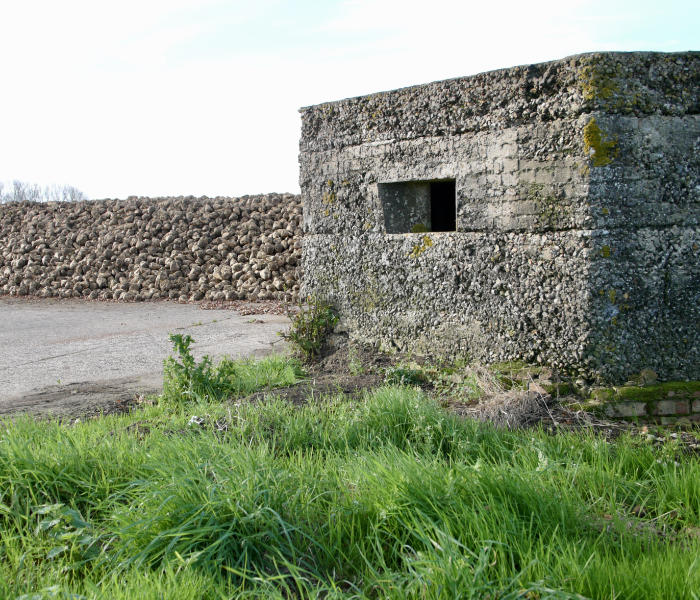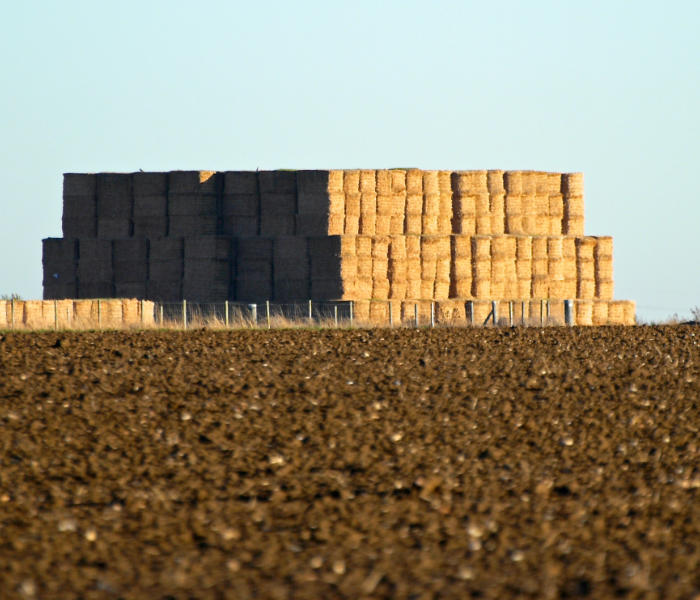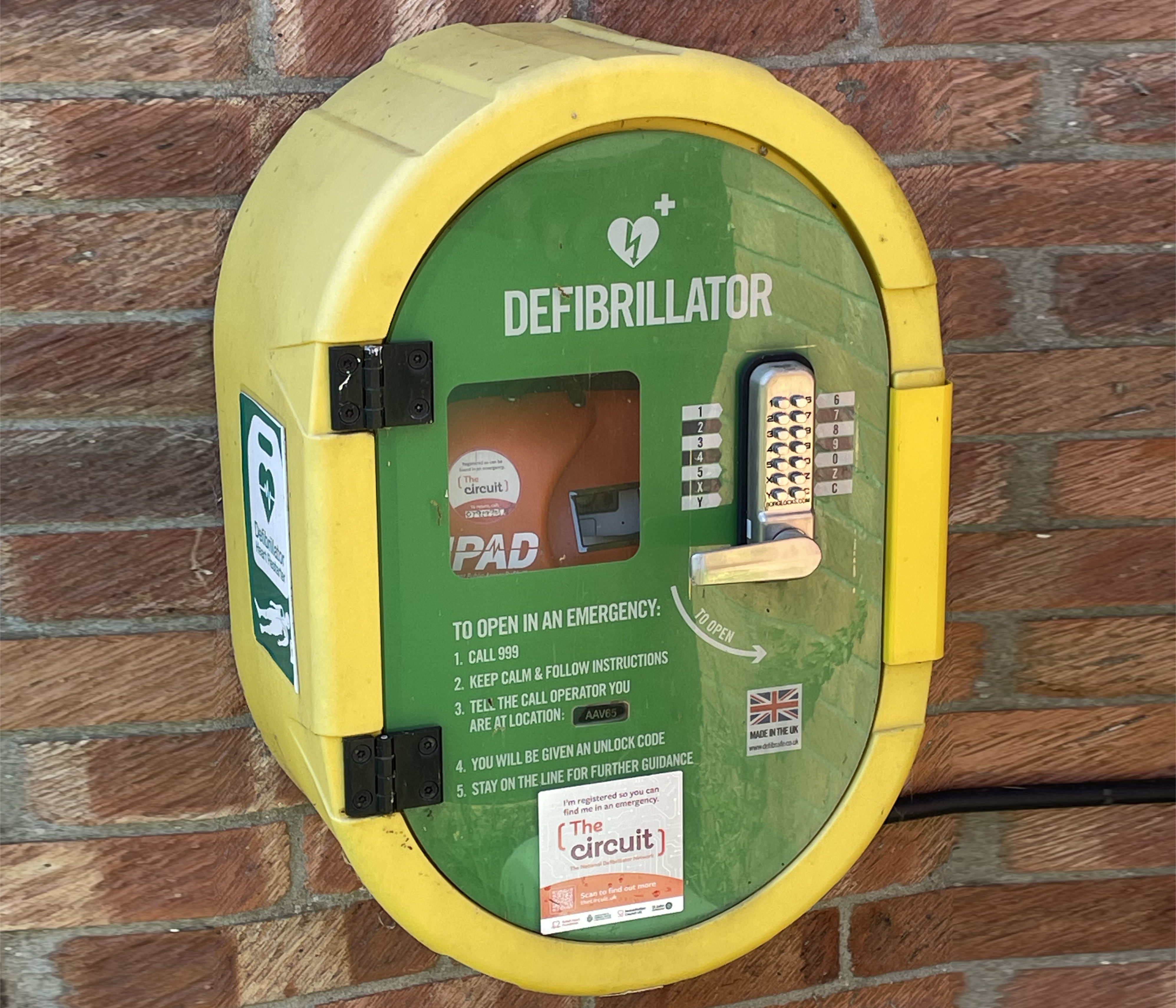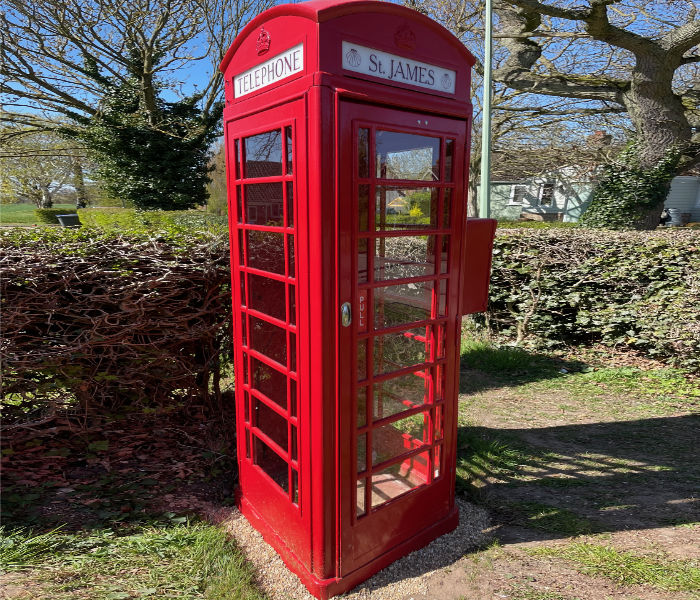Powers & Functions of a Parish Meeting
THE POWERS OF A PARISH MEETING IN A PARISH WITHOUT A SEPARATE PARISH COUNCILThe following material has been provided and included with the kind agreement of the National Association of Local Councils (NALC)
This advice note was written by the (NALC)in-house solicitors and last updated on 1 September 2014. The information and commentary in the note do not constitute legal advice for any individual case or matter. For specific advice on your circumstances, we strongly encourage you to seek tailored legal advice.
Purpose, name, style, constitution and governance
Unless indicated otherwise, references in this note to sections are references to sections in the Local Government Act 1972 (“the 1972 Act”), and references to paragraphs are references to paragraphs in Part III of schedule 12 to the 1972 Act.
In every parish in England, there is a parish meeting for the purpose of discussing parish affairs and exercising any statutory functions conferred on them (s.9(1)). The local government electors in a parish are the parish meeting (s.13(1)). Neither legislation nor case law define the term “parish affairs” but a good example of a case which did decide whether a particular issue was a parish affair is R. (on the application of Letchworth Garden Heritage Foundation) v Returning Officer for the District of North Hertfordshire (2009). In NALC‘s view, parish affairs are specific to the local government electors in a particular parish.
A parish meeting must assemble annually between 1 March and 1 June and on at least one other occasion during the year on a date to be fixed by the chair of the meeting (paragraphs 14(1) - 14(3)). At its annual assembly, the parish meeting must elect a chair, who continues in office until his successor is elected at the next annual assembly (s.15(10)). The chair chosen for the year in question, if present, must preside at an assembly of the parish meeting (paragraph 17(2)). If the chair is absent from an assembly of a parish meeting, the parish meeting may appoint a person to take the chair and that person shall, for the purposes of that assembly, have the powers and authority of the chair (paragraph 17(3)). A casual vacancy in the office of the chair of a parish meeting, occasioned for example by his resignation, shall be filled by the election of his successor at an assembly of the parish meeting convened for such purpose (s.88(3)).
A parish meeting may not assemble in premises licensed for the supply of alcohol, unless no other room is available free or at a reasonable cost (paragraph 14(5)). A parish meeting may assemble in school premises (s.134). An assembly of a parish meeting is subject to other statutory requirements (schedule 12 to the 1972 Act) such as giving advance public notice of any such assembly, attendance, voting and minute taking.
If a parish has a parish council, the parish meeting is not a body corporate. If the parish has no parish council, the chair of the parish meeting and the proper officer of the district or unitary council (i.e. a person appointed by that council) are the body corporate of the parish meeting and are known as “the Parish Trustees” (s.13(3)). The proper officer of the district or unitary council may be the monitoring officer, but this is not always the case. In a parish without a parish council, contracts with a parish meeting are signed by the parish trustees and ownership of parish property is vested in the parish trustees. The parish trustees must act in accordance with the directions given by the parish meeting (s.13(4)). However, they are not obliged only to act as so directed. In Taylor v Masefield (1986), the Court of Appeal held that the parish trustees had an implied power to act in any way necessary or desirable in the execution of their trust which did not conflict with a direction of the parish meeting; it was not necessary to obtain a direction before acting.
A parish meeting may appoint committees of local government electors for the parish to discharge any of its functions (s.108) but any arrangement will not prevent the meeting from exercising those functions. The parish meeting may, subject to the provisions of the 1972 Act, regulate their own proceedings and business (paragraph 20(2)).
Parish meetings are local government bodies or public authorities for a number of statutory purposes. They are, for example, subject to the Human Rights Act 1998 and the Freedom of Information Act 2000. They are also subject to the Equality Act 2010 and they must not discriminate against a person with a protected characteristic (meaning age, disability, gender reassignment, marriage and civil partnership, sex, pregnancy and maternity, race, religion or belief or sexual orientation) as employers or in the provision of services or in the exercise of their functions. Parish meetings are also capable of mounting legal claims (e.g. Lasham Parish Meeting v Hampshire County Council (1992) where the parish meeting applied to the High Court to quash an order of the county council which had classified a footpath as a byway open to all traffic).
At the request of a parish meeting, the district or unitary council (which includes a London Borough council) may change the name of the parish (s.75(1)). The district or unitary council must give notice of any change of name to the Secretary of State, the Director General of the Ordnance Survey and to the Registrar General. The district or unitary council must also publish the change of name in the parish and elsewhere in such manner as it considers appropriate. (s.75(2)).
A parish meeting may, by resolution, have an alternative style being a “community”, or a “neighbourhood” or a “village” (ss. 12A and 17A). As soon as practicable after passing a resolution changing its style, the parish meeting must give notice of the change of style to all of the following:
- Secretary of State
- Local Government Boundary Commission for England
- Office of National Statistics
- Director General of the Ordnance Survey
- Any district council, county council (or London borough council) within whose area the parish lies.
With reference to paragraph 8 above, if a parish has the style of a community, the parish trustees are known as “the Community Trustees” of the said community (s.13(5A)). If a parish has the style of a neighbourhood, the parish trustees are known as “the Neighbourhood Trustees” of the name of the neighbourhood (s.13(5B)). If a parish has the style of a village, the parish trustees are known as “the Village Trustees” of the name of the village (s.13 (5C)).
Establishment, alteration and abolition of (i) a parish and (ii) common parish council for two or more parishes
Parish meetings do not exist in every part of England. They are generally absent in metropolitan areas, but can be created where they do not currently exist. A new parish may be created as a consequence of a community governance review undertaken by a district or unitary council under Part 4 of the Local Government and Public Involvement in Health Act 2007 (“the 2007 Act”). Pursuant to 87(2) of the 2007 Act, a new parish may be created in any one of the following ways:
- By establishing an unparished area as a parish.
- By aggregating one or more unparished areas with one or more parished areas.
- By aggregating parts of parishes.
- By amalgamating two or more parishes.
- By separating part of a parish.
If a new parish is created, the community governance review will decide the name of the new parish (s.87(5) of the 2007 Act), and whether it should have the style of a community, or a neighbourhood or a village (s.87(7) of the 2007 Act). A community governance review may also result in the abolition or alteration in the area of an existing parish (s.88(2) of the 2007 Act). A review may decide to make no changes to the governance arrangements for the area it is concerned with. The review will decide whether the name of an existing parish should be changed (s.88(3) of the 2007 Act).
A parish meeting may request the district or unitary council to make an order establishing a common parish council for a group of two or more neighbouring parishes (s.11(1)). Neighbouring parishes can only be grouped under a common parish council with the consent of each of the parish meetings (s.11(2)). The district council or unitary council may make an order to dissolve a common parish council or separate one or more of the parishes from the common parish council if requested by the common parish council or a parish meeting represented by the common parish council (s.11(4)). A community governance review may have the consequences of dissolving or separating a parish that is grouped under a common parish council.
Finance
A parish meeting may precept the billing authority (i.e. a district or unitary council) for the expenditure incurred in the performance of its functions. The chair of a parish meeting is responsible for the issue of the precept to the billing authority (s.39 (2) Local Government Finance Act 1992). The accounts of a parish meeting are subject to audit in the same way as those of a parish council (s.2 Audit Commission Act 1998 and schedule 2, para (1)(c)). The chair of the parish meeting is responsible for the accounts and financial management of the accounts of the parish meeting as prescribed (s.150(6) and the Accounts and Audit (England) Regulations 2011/817).
Functions and powers
Subject to the circumstances explained in paragraph 16 below, parish meetings have a limited number of statutory functions, powers and rights of notification or consultation. These include:
- Allotments — A parish meeting may hold and administer allotments for cultivation (s.33(3) Small Holdings and Allotments Act 1908).
- Burials — A parish meeting is a burial authority. It may, therefore, provide burial grounds and may contribute towards the cost of burial facilities provided by others (Para 1(c) of Schedule 26 to the 1972 Act).
- Cemeteries and crematoria — A parish meeting may adopt byelaws made by a district or unitary council (Para 11(1) of Schedule 26 to the 1972 Act).
- Charities — A parish meeting may appoint trustees to parochial charities (s. 299 of the Charities Act 2011).
- Churchyards — The liability to maintain a closed Church of England churchyard may be transferred to a parish meeting by the same process by which such liability is transferred to the parish council (s.215(2) of the 1972 Act). i.e. by serving written request on the chair of the meeting.
- Land — A parish meeting may be registered as the owner of land (e.g. common land) if it has inherited ownership from the appropriate pre-1894 authority, often the Churchwardens and Overseers of the Poor (s.67 of the Local Government Act 1894). A parish meeting has no general power of acquisition but may acquire land to exercise its allotments or burial powers. It may appropriate land from one purpose to another with the approval of the Secretary of State (s.126 of the 1972 Act).
- Lighting — A parish meeting may light roads and other public places in the parish (s.3 of the Parish Councils Act 1957).
- Rights of Way — A parish meeting is entitled to be notified of a proposal to declare unnecessary highway to be not maintainable at public expense(s. 47(4) of the Highways Act 1980), a public path creation order or extinguishment order (part 1 of Schedule 6 of the Highways Act 1980), a stop up or diversion order (s.116(3) of the Highways Act 1980). See also LTN 77 – Public Rights of Way. A parish meeting may apply to the highway authority to modify the definitive map (s. 53(5) of the Wildlife and Countryside Act 1981 and Schedule 14).
- Village greens — A parish meeting may prosecute a person who damages or encroaches upon a village green in the parish with the effect of interfering with the green as a place for recreation and thus commits an offence under s. 12 of the Inclosure Act 1857 (or s.29 of the Commons Act 1876) and s.189(3) of the 1972 Act).
- War memorials — A parish meeting may maintain, repair or protect any war memorial in the area (ss.1 and 4 of the War Memorials (Local Authorities’ Powers) Act 1923).
Acquisition of additional functions
On the application of the parish meeting, the district council may make an order which confers the function(s) of a parish council on the parish meeting, subject to the provisions of any grouping order if the parish is grouped with another parish (s.109). The district council must send two copies of any order made under s.109 to the secretary of state.
Value Added Tax
Parish meetings are not local authorities for the purposes of the VAT legislation. They must therefore pay VAT on any purchases which attract it and cannot claim a refund. The acquisition of additional functions (see the preceding paragraph) makes no difference to this situation.
Extensions to St James Parish Meeting Powers
In December 2002, the then District Council, Waveney District Council, with the agreement of the Deputy Prime Minister’s Office, extended the general powers and functions listed above as follows:
WAVENEY DISTRICT COUNCIL HEREBY confers the following powers and associated fundraising power on ST JAMES SOUTH ELMHAM PARISH MEETING:
- Parish meeting expenses
- Auditing costs
- Insurance
- Training courses for committee members
- The Parish Church burials
- The Community Hall
- The Community Bus
- The Community News
- Village signs and seat maintenance
- Ability to receive and spend monies from grant-making bodies
- Maintenance of trees, woods, hedges, footpaths etc
- Publicity, advertising, history
- One-off events to mark national or local celebrations
- One-off donations to permitted organisations
- Subscriptions to Suffolk Acre and SALC
On 19 January 2023, EAST SUFFOLK COUNCIL made an order conferring on St James South Elmham Parish Meeting the function of a parish council to acquire and hold land for the purpose of general community use:
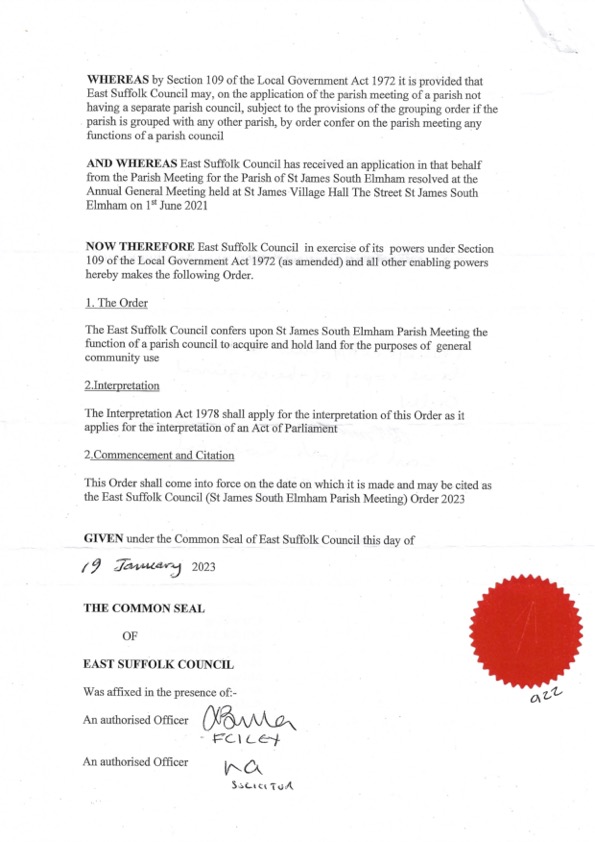
This then enabled the Parish Meeting to acquire the land to the west of St James Lane, including Sheet Field Wood, and to establish the ST JAMES VILLAGE GREEN in 2024.


